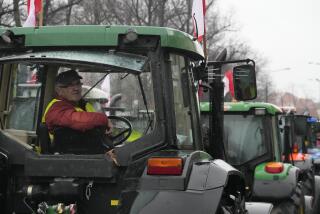2 Polish Officials Visit Pope; Speech Warning Seen
- Share via
LODZ, Poland — Two senior officials of Poland’s Communist regime paid a surprise call Saturday on Pope John Paul II as he visited the country’s most sacred shrine, arousing speculation that they brought a warning to tone down his bold encouragement of pro-Solidarity sentiments in the country.
Church sources also speculated that the two government officials might have been trying to arrange a final, unscheduled meeting between the Pope and Poland’s leader, Gen. Wojciech Jaruzelski, before the pontiff departs today to return to Vatican City.
The Vatican spokesman was not immediately available to clarify the purpose of the reported meeting.
The Polish government spokesman, Jerzy Urban, confirmed that two government officials, Kazimiera Barcikowski and Stanislaw Ciosek, were in Czestochowa on Saturday morning, as was the Pope. Urban declined to say whether Barcikowski, a member of Poland’s Politburo, and Ciosek, a close aide to Jaruzelski, met with the Pope.
“Contacts between representatives of the joint government episcopate commission are a normal thing,” Urban said. “I have nothing more to add.”
Meeting at Chapel
But unofficial church sources said the meeting took place and was attended by Cardinal Agostino Casaroli, the Vatican secretary of state, and Cardinal Jozef Glemp, the Polish primate. The meeting was said to have lasted from 8:30 to 8:40 a.m. at the Jasna Gora Chapel, site of the famed Black Madonna shrine in Czestochowa.
Father Jerzy Tomzinski, the official spokesman for the monastery where the shrine is located, said, “There is no one authorized to confirm or deny” reports that the Pope was issued a warning by the government officials.
However, the possibility of a warning would seem to fit into a pattern of increasing government discomfort with the pontiff’s open praise of the ideals of the now-outlawed Solidarity movement.
Beginning Thursday as the Pope took his pilgrimage to Solidarity’s heartland in the north of Poland, his encouragement for the independent trade union gathered steady force, culminating in a Mass on Friday before a million cheering worshipers in the Baltic port city of Gdansk, during which he repeatedly evoked the memory of Solidarity.
A march by demonstrators after the Mass resulted in a number of injuries and 32 arrests when marchers clashed with club-wielding Polish riot police, whose presence in growing numbers has lent an air of increasing tension to the Pope’s journey in recent days. The mood of the police suggested the government’s increasing displeasure with the Pope’s message.
Police Roadblocks
Even senior Vatican officials complained that they have had difficulty moving through police roadblocks in cities on the papal route. Other church officials were distressed because the government failed to produce nationwide television coverage that was promised for most of the papal events this week. Only two events so far--John Paul’s meeting with Jaruzelski on Monday and an indoor Mass for a relatively small group of people in Krakow--have been shown outside the cities where they occurred.
The speech to seamen in Gdynia, where the pontiff most forcefully escalated his praise of Solidarity, was not even televised locally. Church officials said that the government, which is responsible for the transportation of journalists who are following the papal route, deliberately arranged travel schedules so the press would miss the Gdynia event altogether and arrive too late in nearby Gdansk to witness the controversial meeting of the pontiff and Solidarity leader Lech Walesa.
Explaining the rising crescendo of the Pope’s references to Solidarity, in defiance of the regime, the Vatican spokesman, Joaquin Navarro Valls, said, “The Pope continues to go deeper in connecting the themes raised by Solidarity--freedom, pluralism, free association--with the ethical principles embodied in the social doctrine of the church.”
Another church source said that a “major part of the Pope’s intent was to show the bishops of Poland that you can talk about Solidarity if you use the right language.”
The Uncapitalized Word
John Paul has been careful in all of his remarks to use the uncapitalized word, solidarity, in the context of developing themes in his speeches and not as the capitalized title of the banned trade union Solidarity. But by giving it emphasis along with his calls for human rights, free trade unions and pluralism, he has left no doubt that he has in mind the outlawed union.
In the course of a relatively quiet day Saturday, the Pope used the word only once while speaking to the weavers of the giant Uniontex textile factory at Lodz.
More to Read
Sign up for Essential California
The most important California stories and recommendations in your inbox every morning.
You may occasionally receive promotional content from the Los Angeles Times.













